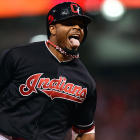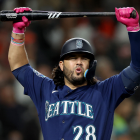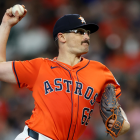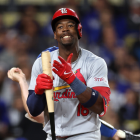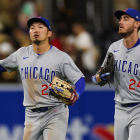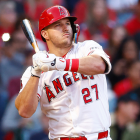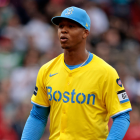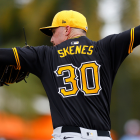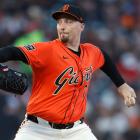It's a moment all baseball players dream of from the moment they first pick up a bat: Hitting a dramatic home run in Game 7 of the World Series. Rajai Davis waited 36 years and 1,219 major-league games (counting regular season and playoffs) to pull it off. His game-tying two-run homer in the bottom of the eighth inning of Game 7, off the hardest-throwing pitcher of all time, sent shockwaves throughout the baseball world. For a 38th-round draft pick who clawed his way to an 11-year big-league career based far more on speed than power, it was a damn miracle.
Davis' home run would become something of a footnote, thanks to the Chicago Cubs completing a 3-1 series comeback to win their first World Series title in 108 years. But the moment will still resonate for Davis, and many of us who watched that night, for years to come.
I recently sat down with Davis at the MLB Players Association Players Trust charity poker tournament to discuss his long journey to the big leagues, the incremental improvements every player must make to reach and then thrive in the Show, what it felt like to play a pivotal role in a historic moment, and the lessons he has learned from a life in baseball.
Davis was so generous with his time, we ended up talking for well over an hour. So we're running this conversation as a two-part series. You can find Part 2 here. Enjoy!
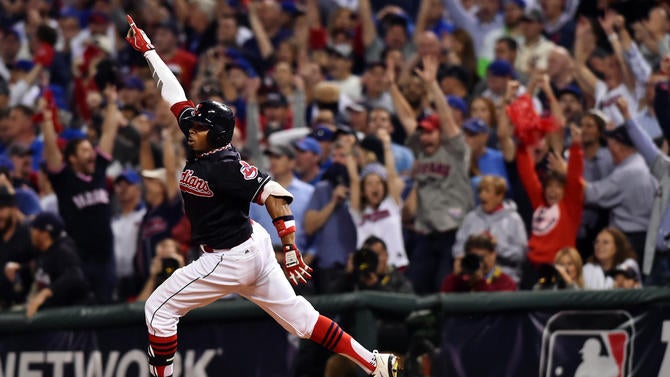
Jonah Keri: I love the stories of guys who come up in a roundabout way. You're in Connecticut playing at the collegiate level, was there an expectation that you were going to be a big leaguer?
Rajai Davis: For me, when I was 11 years old that's when the process started. I set my goals, I set my dreams, I worked at it ever since then. I was outside swinging. I was one of those kids that was always outside. Even when it was raining I was outside.
JK: Connecticut is not a great baseball state.
RD: More of a basketball state actually. I played basketball, that was actually my favorite sport. And I would cease playing everything when basketball season came up, but baseball was the one sport that lasted two seasons. So football got fall, basketball got winter, but baseball got spring and summer.
JK: The six months a year when there's a little bit of sunshine in Connecticut.
RD: Right [laughs].
JK: I'm from Canada, I'm right there with you.
RD: For me, no circulation in my fingertips ...
JK: You hit it off the end of the bat, it's the worst.
RD: That crushes you! But you want to just hit it on that sweet part of the bat, which when it's cold still stings with a metal bat. But just having that mindset was a big thing for me.
JK: So you're not sweating necessarily about, "Oh, this is what the scout says." As far as you're concerned, your dream was just going, and maybe you're not playing at LSU or Stanford, but you're playing, you're pursuing the dream, you're still going at it.
RD: Oh, absolutely. I think it goes back to who is the biggest figure in our lives? When they say something to you, for me it was my parents, you tend to believe them more than anybody else.
So the biggest person in my life at that time was my mom. She said to me, "You can do all things through Christ who strengthens you." I just believed it. That was the one thing I could stand on when things got hard, got tough. It was a seed that was planted when I was young, but all of a sudden that seed began to grow, began getting stronger, I'm starting to have more confidence in what I believe because of those seeds that were planted that I watered, by constantly revisiting that idea. It seemed like it was so far away, it seemed like, it is such a hard thing to do, but as a kid I didn't think that way. As a kid, "This is going to be easy! Everybody makes it to the big leagues!"
JK: A little bit of naïveté is good.
RD: Yeah. I didn't have anybody telling me that I couldn't. As a kid, that's what I needed. Nobody told me I couldn't, so that means I can. So I continued the process of just working, working, working on my swing. And I had people in my life that would share enough for me to go on. I had my uncle who was the initial. He was the one that got me my first bat and my glove. I started swinging my bat every day, he's the one that told me, "You've got to hold it this way. You've got to swing all the time. Somebody is going to be better than you. There's always somebody."
So that would challenge me, he'd say those things when we'd be in his room or something, it would be raining outside, pouring, and he'd say, "Hey, somebody's working harder than you." For me, that was the challenge. "You're going to bring this up on me now? No one's outside. It's raining." But that was my motivation, that spark, okay I'm going to show you, I'm going to be like that. I continued to move on, I ended up moving from one town to the next town, from middle school to high school, my freshman year I was going into another town with guys I'd never played with, a coach that had never seen me play. I'm going to a new town where they don't know me so they don't know what to expect from me. I had to prove myself all over again. This has been a constant theme in my life.
JK: And you're not the biggest guy.
RD: Right. Constantly having to prove myself over and over and over and over and over again, until it becomes a part of who I am: I'm going to prove you wrong because of what you said. Just say what you want, and then I have to prove that it's not who I am, whatever you think I am that's not who I am.
JK: You've always been a speed guy. Growing up, were you a Henderson fan? Were you a Lofton guy? Were you a Raines guy? Were you a Vince Coleman guy?
RD: I was more of a Rickey Henderson guy. The only problem was, I didn't get to see him much growing up in Connecticut. I would see the highlights, but I didn't get to see him much. He was with Oakland when I was starting to play.
JK: Sort of a similar build. Not too tall.
RD: Yeah. But the thing is, he did everything I wanted to do. He walked. He was able to steal bases like no one else, obviously. The thing is, he could hit homers, and if you made a mistake, he'd make you pay. He had a good swing. He was a great defender, he wasn't just a one-dimensional player. He could play both sides of the diamond and that's really what impressed me the most about Rickey. He's a five-tool player. The kind of player I aspired to be. That was one of the main players. And then when I got a chance to work with him in my first stint with Oakland, it was even better.
JK: He was a baserunning instructor when you were in Oakland, right?
RD: Yeah.
JK: So cool.
RD: He was there for two weeks in Spring Training. So I really got to know all about Rickey Henderson. And I really got to find out how funny this man really is.
JK: I had him on my podcast years ago. The best. The best.
RD: Oh, man. He is so ... I mean, he has stories for years. But his delivery is what gets me. It's just so fun to be around him. I know a bunch of guys that played with him, have stories about him, the way he'd talk. But I didn't get that. I got Rickey, the postseason, the post-professional player, after baseball. So it's a little different.
JK: What kind of instructor was he? Was he really working on the nuts and bolts? Was he talking about the mental side? What was he trying to impress upon you as somebody who was also really coming up as a basestealer?
RD: I was coming up and I was already a basestealer. I already had the nature. But he gave me the encouragement because sometimes you come against resistance and you've been trained one way then you come to another system of an organization who has a different respect for stealing bases, which is not my game. I came up, this is what I did when I'm in my lane. This is what I bring to the table. So you can't take away what I bring. He gave me that encouragement, "Hey man, this is what you do. You have to go but you have to be safe. You have to just step out there and trust that you're going to be safe." And I did, I even had to run through some red lights.
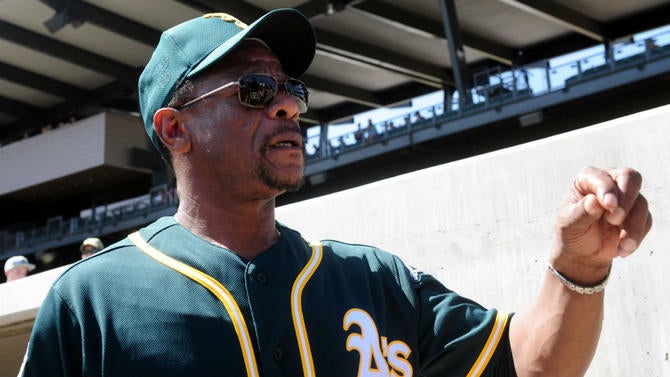
JK: Well, the modern game is a three-run homer game. It's not the 80s anymore. You can't get thrown out. Your number-two hitter could be a beast who hits 40 home runs.
RD: Right. But what is not being said is how me being on base affects the pitcher.
JK: You're distracting.
RD: But he's not going to be affected if he knows I'm not running. If he knows I'm not running as much, it's not going to affect him as much. But they know I'm running, so guess what they do? They pay more attention to me. And once they pay more attention to me, I've got them. We've already won. Now our hitter gets a better pitch to hit. Our players get better pitches because you can't focus on two things and be great at both. You can't. You're going to be great at one or the other. When you divide your focus, you're dividing everything that you have. You're not putting everything that you could have put into that pitch, into that location, so you're going to miss. And basically what it is for me is just breaking their focus. That's why people fail -- because I broke their focus. That's something I've learned over the years, if you can break a player's focus, you can break their success, for that pitch.
JK: When you were coming up through the minors ... I had a conversation with a guy who played in the minors, didn't make it, and he was talking about the difference between being not a top prospect when you're drafted versus being a No. 1 pick. You succeeded throughout your minor league career. You hit over .300, you stole a ton of bases and all that. But especially at the beginning of the low minors, did you feel like you needed to totally outperform the guys with the higher pedigree in order to get ahead? Or did you just trust, "If I hit, I'm going to get to the big leagues and that's it"?
RD: No, I had the mindset that I had to be two, three times better than everyone else.
JK: I would imagine you signed for like $1,000 or something.
RD: Well I was actually fortunate, I negotiated and I actually got five times more than they offered me. And I don't even know how to negotiate! [laughs]
JK: It's not easy. You're a kid at that point.
RD: Yeah. And that right there [that] gave me a little bit of an opportunity, just enough to give me a year. But I struggled that year. That first year, I struggled.
JK: What was it about the adjustment?
RD: The only adjustment that I struggled with was because I started my professional career switch-hitting. I didn't switch-hit in college. I didn't switch-hit in high school.
JK: They wanted you to be a left-handed hitter?
RD: I wanted me to be a left-handed hitter.
JK: Because you thought you'd be more effective that way?
RD: I switch-hit in high school but I got discouraged from continuing on. Freshman year in high school I started, and they didn't want me to switch-hit. I got to sophomore year I tried to do it again, because I'm developing now, but the team wants to win, it's not about developing, it's about winning.
JK: Even though it should be about developing, really.
RD: It should be, because then you get the reward. But it is what it is. Unfortunately, I wasn't able to develop my left-handed swing in the games. So what do I do? Do I keep going on right-handed? Until finally I was like, because I was always swinging left-handed, from the time I was little, I just never did it in a game. I always had a good swing. Finally I would get an opportunity to do it every day at the professional level, so I went to my trial and I just switch-hit. I just did it [laughs].
JK: Why not?
RD: And I get drafted, I'd never hit left-handed against a right-handed pitcher in my entire career, and now I'm hitting against professionals! Guys are throwing 90, and I haven't seen 90 in my whole career.
JK: With breaking pitches that you haven't seen before.
RD: Right. And so that transition was very difficult for me, and so I got demoted to rookie ball to where I could work on it. I came back the next year, had a really good offseason, got really good at hitting left-handed, bunting, got really good at that.
JK: Bunting for hits?
RD: Yeah.
JK: That's a lost art. People don't do that very well. Even the speedy guys it seems like don't do it that well.
RD: And I understand it, because it's hard. It's a skill that you have to really work on.
JK: Even Rickey didn't bunt that well.
RD: Rickey didn't need to. He walked enough. In the big leagues, when you bunt you're out. If you hit a ground ball in the big leagues, you're out 80 percent of the time. So who wants to hit those and be out? So you have to find a way to be successful. So you work with that, on being successful, and that's how guys stay around as long as they do, they find ways to be successful at the big league level.
JK: So rookie league it goes better, you start building your momentum back up.
RD: And so with rookie league, I end up coming to a crossroads. Twenty-one years old, at a crossroads. Short season, about to start. I'm in extended spring, and I'm not playing. Now when you're not playing and you're in extended spring, chances are you're on your way out. Because those guys are going off to short-season teams, and you have another crew that's going to be drafted, another crop. I end up going in to rookie ball at 21 years old, ditched hitting left-handed. Went back to hitting right-handed. And I batted .384 that year, and tore it up.
I always had the confidence, it was just getting the opportunity to play enough games consistently where you can actually get into a rhythm and groove, and the confidence that goes with it. So I ended up able to take that momentum into the entire season, ended up getting promoted to low-A. We eventually won the championship, and I hit really well for those 13 at-bats that I had [laughs]. But that next spring, I had a really bad spring. Because I didn't know how to get ready for spring, I didn't know how to. I was always that guy that as long as I'd play, that was going to get me ready. Then I when I got into full-season, I was a slow starter.
JK: And I guess a lot of guys hire offseason trainers or gurus or something like that. You didn't necessarily do that?
RD: I had a trainer, but I didn't have a hitting coach for the offseason. My trainer was my hitting coach, which was different. So you see pitches, and you're learning, and I'm going through these struggles. The struggles were good for me, I didn't realize how good they were because it was hard.
JK: You're fighting for your baseball life at that point.
RD: Right. But they're actually teaching me lessons and guys would come into spring training and they would dominate. These same guys, you see them in the season, they would struggle. They come down ready for spring training, to make the team. They would make the team, they would be so good, but they had no longevity.
JK: Peaking early.
RD: Peaking way too early. And so, I was never that guy. I always peaked late.
I got off to a slow start but I gained confidence. The first manager I ever had in pro ball was very understanding. He let me go through my struggles. He let me go through my ups and downs. And I got to a point during the season, it was like maybe the 3rd of June, I had maybe 250 at-bats, at this point it's really tough to get your at-bats. I'm hitting like .265, but I made up in my mind that I needed to get over .300. That was my goal, I wanted to get over .300. So what did I need to do? I needed to get focused. And my focus was just getting my routine down. Staying with my routine. Not deviating, not getting away from it, just staying with it. And part of that was sacrificing the night life.
JK: Which is tough to do in your early 20s.
RD: Yeah. I'm a young guy, the first time on my own.
JK: Yeah right, you went to college back home in Connecticut.
RD: I was always commuting, so I was going home, so I never really had that college experience, so this was my first time away from home.
JK: What town are you in at this point?
RD: I'm in Hickory, North Carolina. In the middle of the 'sticks. I end up getting up over .300, up to like .317, from .265.
JK: Mid-season! That's pretty good. So you're hitting .480 or something.
RD: Mid-season. I was killing it.
JK: Was that when the light went on?
RD: Actually it was. Now at this point, I know I can play. And I end up hitting .305, stealing 40 bases, and I had so much confidence. So the next year was a breeze, spring training, all that. I end up what I thought was winning the batting title the next year in high-A, hit .314. According to the computer it had me leading the league, because there was nobody even close as far as at bats. Come to find out years later, there was something done that I didn't agree with.
JK: Oh! Some juking of the stats.
RD: Yeah. Somebody didn't qualify. But they allowed me to qualify if I give them X amount of at bats.
JK: That's not cool.
RD: I had 500-plus at bats. I was there the whole year. A guy comes up, hits .300-and-something at bats, maybe .340 or something, and he ends up winning the title, and I'm like, "How does that happen?" I'm thinking, "Man, I'm about to get my second title." But these are the kinds of things that always continuously happen to me.
JK: But the chip on your shoulder is good in baseball.
RD: Yes, yes. So now I've got to prove I can do it again. But now I'm going to Double-A. I get off to a pretty good start, pretty good that year, .280 my first year, and there's guys I'm playing against ...
JK: Right, Double-A, they say there's almost a bigger jump from Single-A to Double-A than from Triple-A to the big leagues ...
RD: Right. And so okay, now I have to steal 45 bases. Now I have to really get out hitting, as long as I play every day, I'm like 'man, I've got to earn it.' At the end of the year, I was scheduled to go to Arizona. Then I broke my fifth metacarpal with 13 days left in the season.
JK: Oh my god.
RD: So that kind of puts you on the fast track, you go to the Arizona Fall League and do well out there, BAM!, now you're a prospect, now you're like BOOM! So I break my fifth finger. I end up going to Triple-A the next year, struggle the first three months.
JK: How do you deal with that mentally, with the demons? With knowing you're about to go to the Arizona Fall League, you get this setback, you're in Triple-A, it's like now you can taste it? The shot at the Show is happening.
RD: I went to play winter ball to get that confidence back.
JK: That's good. So the answer is to play through it.
RD: Yeah. That's right, play through it. I played winter ball, I played in Mexico, they would throw a lot of curveballs and I figured I needed to work on that. And I ended up going there and playing, and it went well down there. Came into spring training, this would be my second big league camp, so I actually had a really good camp.
JK: And the instructors know you a little bit, the coaches know you.
RD: Yeah. My first go-round I don't even think I got a hit, 0 for 11. But my second go-round, now I'm feeling comfortable, I'm not as intimidated by big-leaguers. Now I feel like I'm one of them or closer to being one of them. Triple-A I struggled. It's so close to the big leagues, but I struggled my first three months, I'm hitting .220.
JK: And you're not going to make up for it. If you're Adam Dunn you can hit 40 home runs with .220, but you're not Adam Dunn.
RD: Right. And so now I'm like, I've got to get my average up again. But this time, I wasn't really out there. It wasn't the night life, it wasn't anything. It was just me. It was a jump for me, this was a challenge. And making that adjustment, because these guys were throwing pitches that I hadn't seen. We're talking about more big leaguers playing at this level.
JK: Cutters ...
RD: Cutters, sliders, sliders in the dirt that are located a little better. Now I'm facing pitches I'm not used to, so I'm making the adjustment now because they're smarter now. I was just going on talent before, now I actually have to use my brain. Use my mind to think along with them. So I'm three months into the year and I'm hitting .220 and I'm like 'man, I don't know.' I started talking to one of my good friends at the time who encouraged me. He was able to encourage me at the time because man, I was struggling, and that day he encouraged me, I went out and got four hits, and then that sparked a whole drive. I ended up hitting .283 and finished decent, and got called up.
JK: What's that like? We've got to talk about that. The call to the Show is the best. If you get one at-bat in your career or if you go on to be Babe Ruth, that moment ... Tell me about that day, tell me about the feeling, all of it.
RD: We were in Charlotte, North Carolina, and I was sleeping in my bed. The coach calls me, he says, "You're going to the big leagues." I'm half-awake, "Are you serious?" When you're talking about since I was 7 years old waiting, preparing, until I was 25 years old.
JK: It's almost 20 years.
RD: Almost 20 years for that call to the big leagues, 20 years waiting for one call. Preparing for one call to the big leagues. And watching as I grew up, guys that I idolized, now I'm going to be on the field watching them play, in the front row. And I paid 20 years for this ticket. It was a heavy price I paid for those tickets. But nonetheless that was something that I wanted. And that day I packed all my stuff up as quick as I could.
JK: Who's the first person you called?
RD: I had to call Mom.
JK: What did she say?
RD: They were so ecstatic. They surprised me because they couldn't really afford to be there, but they ended up making it to my debut.
JK: That's so cool! What city did you play your first game?
RD: It was in Pittsburgh.
JK: Okay, you could drive over.
RD: They could drive, yeah. But on my way to the airport, I was supposed to go to the field first, tell the cab driver to go to the field and pick up my baseball stuff, but I was so excited I went right from my hotel right to the airport, got to Pittsburgh with no baseball gear [laughs], no cleats, no shoes, no glove, no nothing. I was just excited to be there. I just wanted to get there. Don't let me go to the clubhouse too, I was just so excited. It felt like, honestly, like this was the most, I've never felt this before or ever since, but it felt like I was in the clouds for four days. Literally in the clouds. This was a dream that was totally impossible that was actually made reality. It was hard to believe I was actually in the big leagues, it was hard to believe that, even though I'd dreamed about it and I expected it.
JK: But probably nobody from your high school went on to the big leagues. You didn't know people in that sphere.
RD: And this is the thing, I'd never really had anybody that made it that far show me how to make it that far.
JK: If you're Ken Griffey, Jr., aside from the fact that you're Ken Griffey, Jr., your dad was also a phenomenal player. You don't have that.
RD: Right, that's not the luxury I had. I didn't have that in college, I didn't have that in high school, I didn't have that when I was in elementary school. It wasn't until I got to professional ball did I start meeting major league players or professional players.













